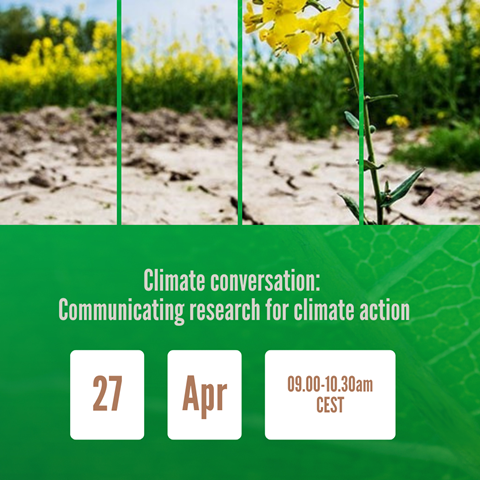SLU Global and SLU Future Forests recently hosted a climate conversation about communicating research for climate action. The webinar was part of a series of webinar inviting speakers to talk about the challenges around climate change hosted by SLU Global and all four Future Platforms.
With the latest IPCC report as a background, SLU Global and SLU Future Forests invited everyone interested to a seminar with emphasis on science communication and public perception.
"Individual AND system change go hand in hand. Think holistically on behaviour. Personal action is connected to collective action." - Peter Newell
How can research be communicated? What role does communication play when it comes to climate change? And what works best, stories or facts in order to get people to take more climate action?
"Embed data in story structure to move the needle on climate communication. Our brains aren’t good at decoding statistical information --and emotion is data critical for triggering action-taking." - Brandi S. Morris
Three eminent speakers were invited to share their knowledge and expertise on how to better communicate research for climate action and they all gave the audience clear take-home messages.
Take-home messages
- Brandi Morris: "My suggestion would be that scientists need to think more strategically, thinking about segmentation. Think about the target audience. It's not one message for every audience, so think about who the key stakeholder is and what specific action and how you want them to take and tailor the message to specific audiences."
- Flora Hajdu: "Don't be afraid to try to communicate also social science messages that are more complex. It’s possible to simplify the message and yet keep essential complexity if you take some training or get help from a communicator.”
- Peter Newell: "Try and meet people where they're at. Try and understand where people are coming from, what they're most concerned about and in the end there will always be a climate change connection."
Flora Hajdu, SLU
Flora Hajdu, Professor at the Department of Urban and Rural Development. Together with Linda Engström, they developed Social benefits from carbon forestry, which is a guide to assess social benefits from projects that aim to store carbon through tree planting, restoration or forest conservation.
Peter Newell, University of Sussex
Peter Newell, Professor at the Department of International Relations, University of Sussex. Peter Newell will talk about behavioral shifts and how researchers can more effectively leverage them.
Brandi S. Morris, Aarhus University
Currently an Assistant Professor at Aarhus University, Brandi is studying the underlying mechanisms of how stories exert their influence on behavior through emotion, identity, and values.
